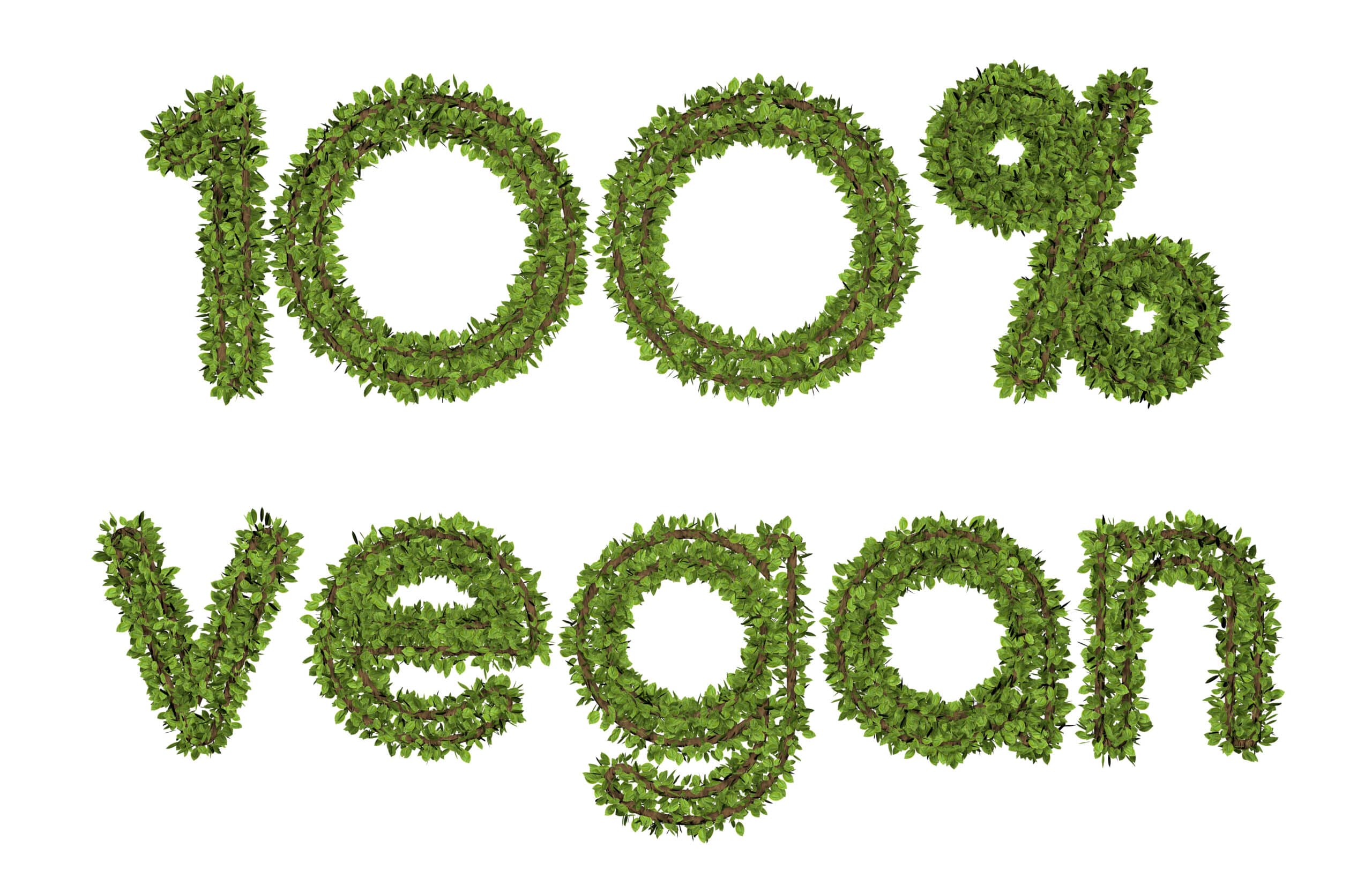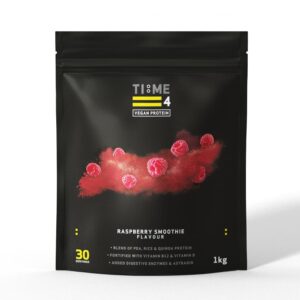THINK YOU KNOW ABOUT TIME 4 VEGAN PROTEIN? THINK AGAIN…
Think You Know About Time 4 Vegan Protein? Think Again…
(Click on the Reference Numbers in Blue for More Info)
Consuming the right type and amount of protein is not only essential for creating and maintaining a lean, muscular physique, but also for good health and life itself. All cells and tissues contain protein and it provides approximately 10 to 15% of our dietary energy. The protein we consume is broken down into amino acids. These are the ‘building blocks’ which combine to form the wide variety of proteins needed by the body for many important functions, ranging from tissue growth and repair and energy production to the regulation of immune function and the production of neurotransmitters, which help to regulate our mood.
There are approximately 20 amino acids that make up the estimated 2 million different types of proteins. Of these 20, 9 are generally considered to be ‘essential’ because they cannot be produced by the body and so must be obtained from our diet. Sources of protein which contain adequate amounts of all of the essential amino acids are known as ‘complete’ proteins.
When we think of sources of dietary protein there is a tendency to focus on animal products such as meat, fish, eggs and milk, which are complete proteins. However, a plant-based diet can provide us with all of the amino acids we require for health and performance and can also offer environmental and additional health benefits.
While some plant proteins such as soy and quinoa may be considered to be complete proteins, most are not. Nevertheless, by combining proteins from different plant sources, we can create a complete protein. For example, rice is low in the amino acid lysine but contains high levels of methionine. Beans, in contrast, contain high levels of lysine but are low in methionine. Therefore, combining rice and beans provides a complete protein. Similarly, pea protein contains all of the essential amino acids but is relatively low in methionine. Again, we can compensate for this by adding rice protein.
Even when combining plant-based proteins, there are still limitation as they are considered to have less of an Anabolic effect than animal proteins due to their lower digestibility. Additionally, certain micronutrients including vitamin B12 and vitamin D3 can be difficult to obtain from a plant-based diet.
This is where Time 4 Vegan Protein can be valuable addition to your diet. We understand that consuming a plant-based diet can provide a range of benefits, and we also understand that it can present a number of challenges. This is why we have developed Time 4 Vegan Protein. This unique combination of carefully selected ingredients not only provides you with a purely plant-based complete protein, but also a variety of other benefits.
We pride ourselves on employing the findings of latest cutting-edge research to produce the most effective and innovative products. In this article, we are going to review some of that research and explain how there’s a lot more to Time 4 Vegan Protein than the name suggests.
How will Time 4 Vegan Protein Benefit me?
The key ingredients of Time 4’s Vegan Protein have been shown scientifically to provide a number of potential benefits for health and performance. These include, but are not limited to:
- Increasing muscle mass (1,2,10,13)
- Increasing strength (1,2,10)
- Increasing muscular power (10)
- Reducing body fat (10,11)
- Enhancing post-exercise recovery (3)
- Improving Glycaemic Control (4)
- Enhancing weight loss by increasing Satiety (5,6,9)
- Improving cardiovascular health (7,8,11,12)
What’s In Time 4 Vegan Protein?
Time 4 Vegan Protein is a blend of plant-derived proteins, which provide a complete source of protein in a convenient and easy to consume format. These include pea protein isolate, brown rice protein, quinoa protein. It also contains protease, AstraGin®, vitamin B12 and vitamin D3. As we look at each of these ingredients in-depth, you’ll begin to see why Time 4 Essential Amino Acids is such a great product and how it may benefit you.
What is pea protein isolate?
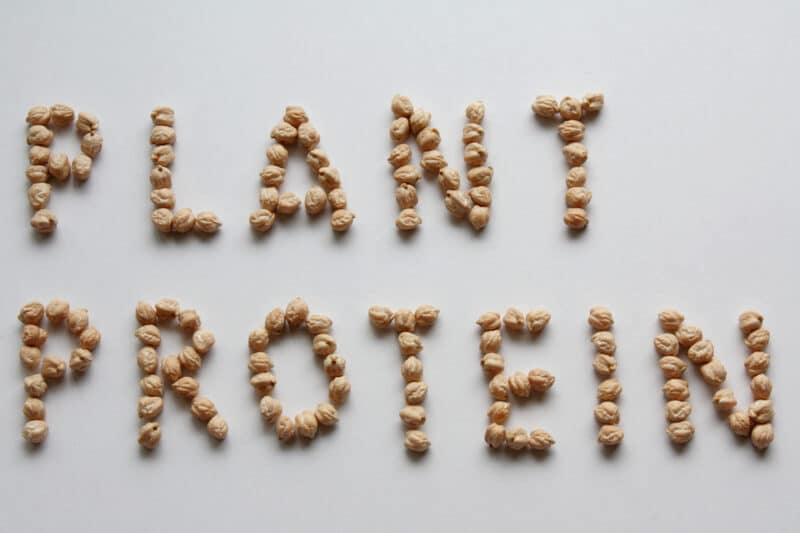
Pea protein isolate is made by isolating the protein from ground yellow peas. It is a good source of iron and a high-quality protein, as it contains all of essential amino acids required to build and maintain muscle. It has also been shown to increase strength, enhance fat loss, and contribute to a healthy cardiovascular system.
What does the science say about pea protein?
A study by Babault et al., (1) compared the impact of an oral supplementation with vegetable pea protein vs. whey protein and a placebo on biceps brachii muscle thickness and strength after a 12-week resistance training program.
The results of the study showed that the supplementation with pea protein promoted a greater increase of muscle thickness as compared to a placebo and to the same degree as whey protein.
The authors concluded that since no difference was obtained between the two protein groups, vegetable pea proteins could be used as an alternative to whey-based dietary products.
Banaszek and colleagues (2) examined the effects of whey protein and pea protein supplementation on physiological adaptations following 8-weeks of high-intensity functional training (HIFT). Participants completed an 8-week HIFT program consisting of 4 training sessions per week. Participants consumed 24 g of either whey protein (n = 8) or pea protein (n = 7) before and after exercise on training days, and in-between meals on non-training days. The results of the study showed that ingestion of whey protein and pea protein produce similar outcomes in measurements of body composition, muscle thickness, force production and strength following 8-weeks of HIFT.
What is brown rice protein?
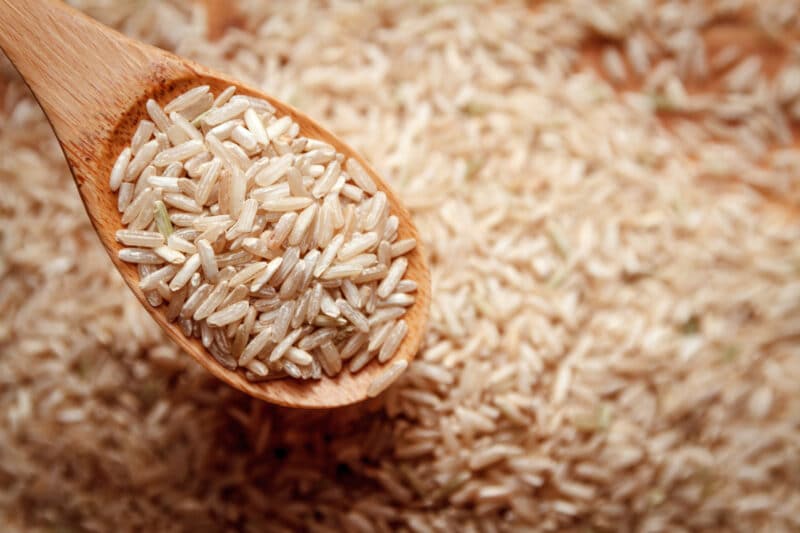
Brown rice protein is produced by isolating the protein via an extraction process. It has a relatively high protein content for a grain and is good source of the branch chain amino acids (BCAAs), which are vital for building muscle. It has been shown to be comparable to whey protein for increasing muscle mass and reducing body fat and can to help prevent weight gain and contribute to a healthy blood fats profile. Brown rice protein is hypoallergenic; making it is less to cause an allergic reaction in comparison to other alternative protein sources.
What does the science say about brown rice protein?
A study by Joy et al., (10) investigated the effects of 8 weeks of whey protein or rice protein supplementation on body composition and exercise performance. The purpose of the study was to determine if the post-exercise consumption of rice protein isolate could increase recovery and elicit adequate changes in body composition compared to equally dosed whey protein isolate if given in large, isocaloric doses.
24 college-aged, resistance trained males were randomly and equally divided into two groups, either consuming 48g of rice protein or whey protein isolate (isocaloric and isonitrogenous) on training days. Subjects trained 3 days per week for 8 weeks as a part of a daily undulating periodized resistance-training program. The rice and whey protein supplements were consumed immediately following exercise
The results of the study showed that both whey and rice protein isolate administration post resistance exercise increased lean body mass, muscle mass, strength and power while fat mass decreased. No differences between the two groups were observed.
What is quinoa protein?
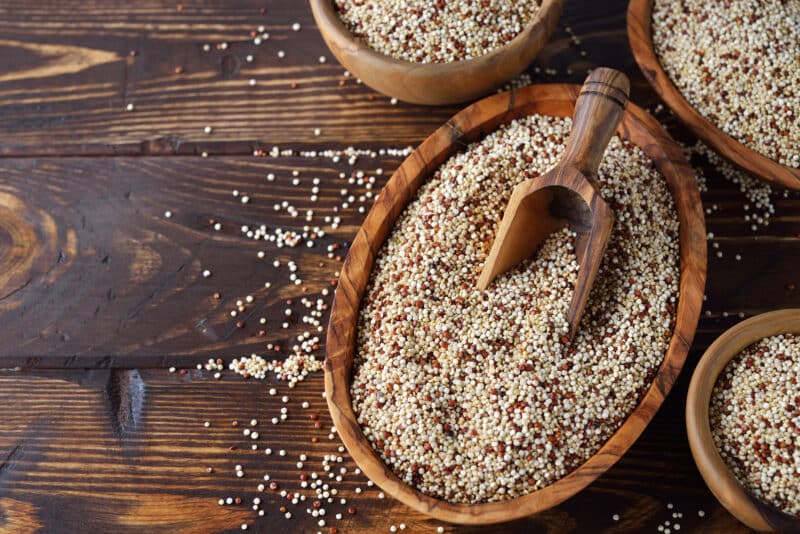
Quinoa is a seed, which is prepared and eaten like a grain. It has been consumed for thousands of years in South America and is now considered to be a ‘superfood’. It is an excellent source of protein as it has an essential amino acid profile reported to be equivalent to that of casein and dried whole milk. Additionally, lysine, one of the limiting amino acids in cereal grains, is found at levels twice as high as those in wheat or maize. It is non-GMO and gluten-free, and has high digestibility.
What does the science say about quinoa protein?
Filho and colleagues (13) reviewed the physical-chemical composition and the functional and anti-nutritional properties of quinoa. They concluded that it is rich in proteins, lipids, fibers, vitamins, and minerals, with an extraordinary balance of essential amino acids. It is also gluten-free, a characteristic that enables its use by celiac patients.
What is vitamin D3 (Cholecalciferol)?
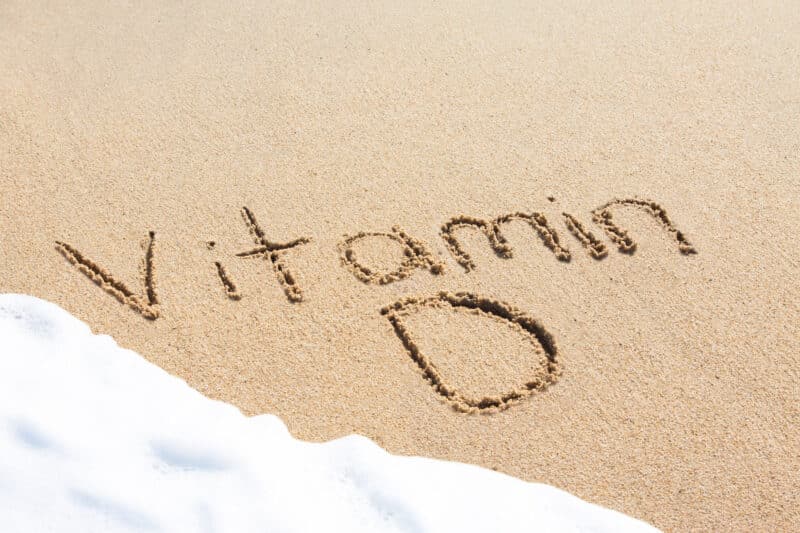
Vitamin D3 is a natural form of vitamin D. It is essential for the regulation of calcium and phosphorus within the body, and plays an important role in maintaining the structure of bone and teeth, and normal immune function. The most abundant sources of vitamin D3 are found in animal products such as oily fish and egg yolks, making it difficult for those consuming a plant-based diet to consume sufficient amounts naturally. Fortified foods such as spreads and breakfast cereals, and supplements are often required to ensure an adequate intake for this group.
How Will Vitamin D Benefit Me?
Although essential for general good health and function, the inclusion of vitamin D in a plant-based protein supplement may not at first, seem relevant. However, a number of recent studies have highlighted vitamin D’s role in building and maintaining muscle (14,15 ,16).
This is because the exposure of skeletal muscles to vitamin D influences the genetic processes that enhance muscle cell type, function and growth. At the same time, vitamin D suppresses the expression of myostatin, a protein that regulates muscle size by inhibiting growth.
In addition, vitamin D increases the number of type II or fast twitch muscle fibres and in particular that of type IIA cells, resulting in an increase in muscular power output, while its deficiency causes type IIA cell atrophy and a loss of strength (17).
The importance of vitamin D supplementation becomes evident when we consider that 50% of the population are vitamin D deficient.
Here are just a couple of examples of the many studies which demonstrate the effectiveness of vitamin D supplementation:
In a review of the effects of vitamin D on skeletal muscle and athletic performance, Abrahams and colleagues (16) noted vitamin D supplementation has been shown to increase muscle strength, particularly in people who are vitamin D deficient. Higher serum levels of vitamin D are associated with reduced injury rates and improved sports performance. In a subset of the population, vitamin D appears to play a role in muscle strength, injury prevention, and sports performance.
Koundourakis et al., (17) conducted a review of the muscular effects of vitamin D in young athletes, non-athletes and the elderly. The muscles are major targets of vitamin D. Exposure of skeletal muscles to vitamin D induces the expression of multiple myogenic transcription factors enhancing muscle cell proliferation and differentiation. At the same time vitamin D suppresses the expression of myostatin, a negative regulator of muscle mass. Moreover, vitamin D increases the number of type II or fast twitch muscle cells and in particular that of type IIA cells, while its deficiency causes type IIA cell atrophy. Furthermore, vitamin D supplementation in young males with low vitamin D levels increases the percentage of type IIA fibers in muscles, causing an increase in muscular power output. Vitamin D levels are strongly associated with exercise performance in athletes and physically active individuals. In the elderly and in adults below the age of 65, several studies have established a close association between vitamin D levels and neuromuscular coordination.
Combining Amino Acids with Vitamin D: What Does The Science Say?
As we have seen in this article, both amino acids and vitamin D play an important role in the structure and function of skeletal muscle, but is there any additional benefit to be gained from combining them?
A number of studies have demonstrated positive results when combining vitamin D and amino acids (15, 16).
For example:
A study by Takeuchi et al., (15) investigated the effects of branched-chain amino acids (leucine, isoleucine and valine) and vitamin D supplementation on physical function, muscle strength, muscle mass, and nutritional status in older adults suffering from a loss of skeletal muscle mass and strength due to ageing. The results of the study showed that strength, muscle circumference and body mass index increased significantly in both groups over time with significantly greater improvements in the intervention group. The authors concluded that an 8-week intervention of branched-chain amino acids and vitamin D supplementation with low-intensity resistance training improves muscle-related outcomes.
Maximising the benefits of Time 4 Vegan Protein

In order for nutrients to become available for use by the body, they must first be digested and absorbed. How fully they are digested and absorbed will determine how much becomes available in the blood stream to be up-taken by the muscles. Our ability to do this, can be impaired due to a number of factors such as aging, poor diet, stress, lifestyle, certain medications and digestive disorders. Additionally, plant-based proteins typically have lower digestibility than their animal counterparts.
Therefore, to ensure that you get the maximum benefit from Time 4 Vegan Protein, we have included Astragin, protease, and vitamin B12 to aid digestion and absorption.
AstraGin®
AstraGin® is a 100% natural compound made from the plants Panax notoginseng, commonly known as Chinese ginseng, and Astragalus membranaceus, a traditional Chinese medicinal plant. It supports increased absorption of a wide range of nutrients, including amino acids, omega-3 fatty acids and creatine, for which it holds a US patent and multiple international patents.
AstraGin® increases nutrient absorption by up-regulating the expression levels of absorption transporters and proteins, which allow greater amounts of nutrients to be absorbed into the body. It also promotes gut health, including reduced inflammation in the intestinal lining.
It is commonly used in products that contain poorly absorbed nutrients, such as turmeric, amino acid-based sports supplements, products promoting gut health, and vitamin and mineral supplements. Due to its quality and efficacy, AstraGin® is used by some of the largest brands in the world in over 200 functional foods, beverages, and supplements.
Protease
The digestion of carbohydrates, proteins and fats into small soluble substances which be absorbed into the blood requires the actions of digestive enzymes. These are secreted by the salivary glands and cells lining the stomach, pancreas, and small intestine to aid in the digestion of food. Although they are produced by the body, they can also be taken in supplement form to promote digestion. Protein, carbohydrate and fat each require specific enzymes for their digestion. Protease is the enzyme responsible for break down of proteins into their basic amino acids. Without it, we would get very little benefit from the protein we consume.
Vitamin B12 (Cyanocobalamin)
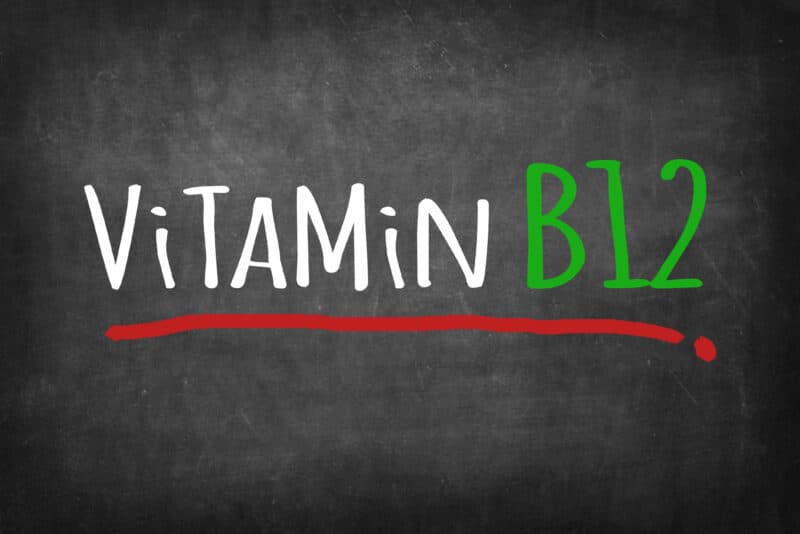
Vitamin B12 is water- soluble vitamin. It plays an important role in the normal function of the nervous and immune systems, energy production, the formation of red blood cells, the metabolism of folate, bone health, DNA synthesis, and in both fatty acid and amino acid metabolism. It also contributes to psychological function and a reduction in tiredness and fatigue. The most abundant sources of vitamin B12 are found in animal products such as fish, meat, poultry, eggs, milk, and other dairy products, making it difficult for those consuming a plant-based diet to obtain sufficient amounts.
Vitamin B12 also aids digestive health by helping to maintain the lining of the gut and encourage a healthy balance of bacteria. It promotes healthy digestion and reduced inflammation in the gut to aid the prevention of inflammatory digestive disorders, which can reduce nutrient absorption.
Why Time 4 Vegan protein?
As we have seen throughout this article, the unique combination of carefully selected evidence-based ingredients in Time 4 Vegan Protein not only provides you with a high quality purely plant-based complete protein, but also a variety of other health and performance benefits.
Don’t be misled by the name; Time 4 Vegan protein is not only suitable for athletes consuming a plant-based diet, but also for those with other dietary restrictions, such as lactose intolerance, which prevents the consumption of many milk-based products. For these individuals, Time 4 Vegan Protein provides comparable substitute for whey protein.
A criticism often made of vegan protein supplements is that they have a less pleasant taste than their dairy counterparts and are difficult to mix. We are proud of the great taste of our range of products and Time 4 Vegan Protein is no exception. Our team of experts have worked tirelessly to develop a combination of ingredients which not only taste great, but also mix well, making it difficult to differentiate between the vegan protein and our whey protein products.
Time 4 Vegan protein is extremely low in carbohydrate and fat and is gluten and GMO free. It is registered with the Vegan Society so you can be sure that it is purely plant-based product, but you don’t need to be a vegan to enjoy its benefits.
Buy Time 4 Vegan Protein Powder.
